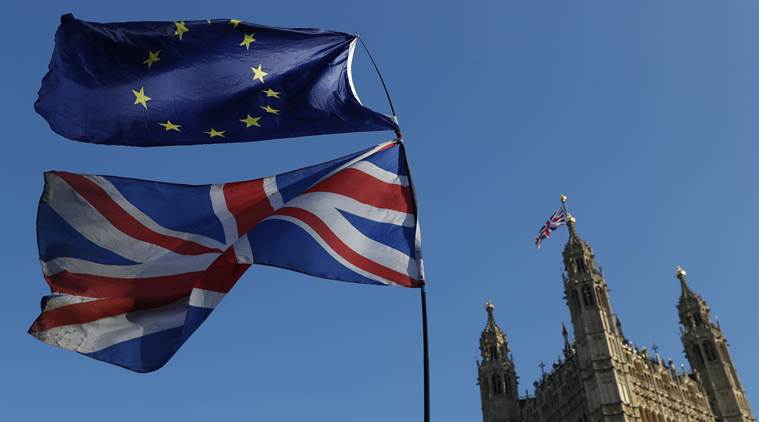- India
- International
European Union Extends Brexit Deadline to October 31
On another difficult night for Prime Minister Theresa May of Britain, European leaders scrapped her proposal for a postponement until June 30, concluding that such a short deadline was unrealistic for the departure known as Brexit.
 The flag of the European Union and the British national flags outside the Palace of Westminster in London. (Source: AP Photo/File)
The flag of the European Union and the British national flags outside the Palace of Westminster in London. (Source: AP Photo/File)
Written by Stephen Castle and Steven Erlanger
With less than 48 hours before Britain’s scheduled departure, the European Union extended the exit deadline early Thursday until the end of October, avoiding a devastating cliff-edge divorce but settling none of the issues that have plunged British politics into chaos, dysfunction and recrimination.
On another difficult night for Prime Minister Theresa May of Britain, European leaders scrapped her proposal for a postponement until June 30, concluding that such a short deadline was unrealistic for the departure known as Brexit. They agreed, however, to review the arrangement at the end of June to prevent British disruption to the bloc while the nation remains in Europe’s departure lounge.
Writing on Twitter, Donald Tusk, president of the European Council, said that the two sides had agreed to what he called “a flexible extension” until Oct. 31, adding that this provided an “additional six months for the U.K. to find the best possible solution.”
Although the intense pressure of recent weeks will probably abate for now, the path ahead still resembles a minefield, dotted with explosive issues like a possible attempt to topple May, a general election or a second Brexit referendum — or some combination of the three. Most immediately, May is likely to face calls to step down, and potential successors are already trying to raise money and advertise their credentials.

The extension to Oct. 31 means that Britain will almost certainly have to hold elections for the European Parliament on May 23, something May once argued would be absurd, almost three years after Britons voted for withdrawal. That prospect seems certain to anger hard-line Brexit supporters.
This was not the first time May requested a postponement to the withdrawal. Originally, she had promised Britons that she would achieve it by March 29, only to have to acknowledge last month that goal was impossible. Having missed that deadline, May was a supplicant to the 27 other leaders of the bloc, who made their latest decision after she had left the room.
Having lost control of the process in Brussels, May will return to a pitched battle with pro-Brexit Conservative lawmakers, including a significant number who now want her out and seem willing to risk an economically damaging departure without an agreement.
Some have argued that Britain should use an extension to sabotage European Union business from the inside. While May has promised not to do so, her position is so shaky that thoughts are turning to how a successor might behave, particularly a pro-Brexit hard-liner like Boris Johnson, the former foreign secretary.
At the same time, if Britain’s Parliament should finally pass the withdrawal agreement negotiated with the bloc, which legalizes Brexit and provides a transition to a new relationship, then Brexit would take place on the first of the next month.
European nations had been divided between those who wanted a shorter extension, to keep up pressure on Britain to resolve Brexit, and those who wanted to give it the time and space to reach a sensible conclusion.
On Wednesday, it was President Emmanuel Macron of France who took the toughest line, arguing that Britain needed to propose a credible plan to resolve the crisis.
On his insistence, plans to give Britain as much as another year were scrapped in favor of a shorter delay. He had argued that a long extension risked disrupting the bloc’s more important work and that Britain’s political confusion could prove contagious — that even a hard Brexit was better than a paralyzed European Union.
But there was never any question of slamming the door instantly on Britain and triggering a disruptive “no-deal” Brexit, which would have occurred Friday night in the absence of an extension. And Chancellor Angela Merkel of Germany stressed the need for Britain to have time to manage an orderly process, which would allow for a good relationship between the two sides after the divorce.
The October deadline, which could itself be extended, was therefore a compromise, chosen in part because it would keep Britain outside the new European Commission, which will be formed in the fall.
Writing on Twitter, Prime Minister Joseph Muscat of Malta, described the decision as “sensible since it gives time to UK to finally choose its way.”
So far, the British Parliament has shown little indication that it will ever approve the withdrawal deal that May negotiated with the European Union. That is a legally binding treaty that would resolve technical issues, like the government’s outstanding financial commitments to the bloc, and keep Britain inside its economic structures until at least December 2020.
After that point, May wants to detach Britain from Europe’s customs union and single market, and to take control of immigration from the Continent.
That formula has been rejected three times in Parliament and, despite attempts to broker an accord with the opposition Labour Party, prospects for its passage still look low.
More talks between the parties were scheduled for Thursday, but Labour has complained that May has shown no sign of budging from her basic goal of taking Britain out of a customs union with the bloc.
Were she to accept staying in a customs union, which is Labour’s bedrock position, that would preclude Britain forging trade deals on its own, defeating, in the minds of pro-Brexit lawmakers, the entire purpose of Brexit. Such a step would risk Cabinet resignations and enrage the party faithful.
In the coming weeks there may be more votes in Parliament to gauge opinion on various approaches to Brexit, but the possibility of assembling a sustainable majority for any one blueprint still seems remote.
Conservative Brexit supporters are hoping they can replace May with a hard-liner who could reopen the withdrawal agreement painfully negotiated over months with the European Union.
But European officials emphasize that the withdrawal agreement, including a provision known as the Irish backstop, designed to guarantee no hard border between Northern Ireland and Ireland, will not change. If Britain wants a managed Brexit, it must pass the withdrawal agreement first, they say: Only then can the European Union begin negotiations on a future relationship.
There is little expectation in Brussels that May’s current negotiations with the opposition Labour Party will come to a positive conclusion. But whether a long extension means the end of May’s premiership and new elections is not Europe’s concern, the officials say.
The difference now, in contrast to the last emergency council meeting last month, is that the European leaders have decided to take control over the length of any extension. What Britain then decides to do — including a no-deal Brexit or a decision to stay in the European Union — would be up to Britain.
May 02: Latest News
- 01
- 02
- 03
- 04
- 05





































